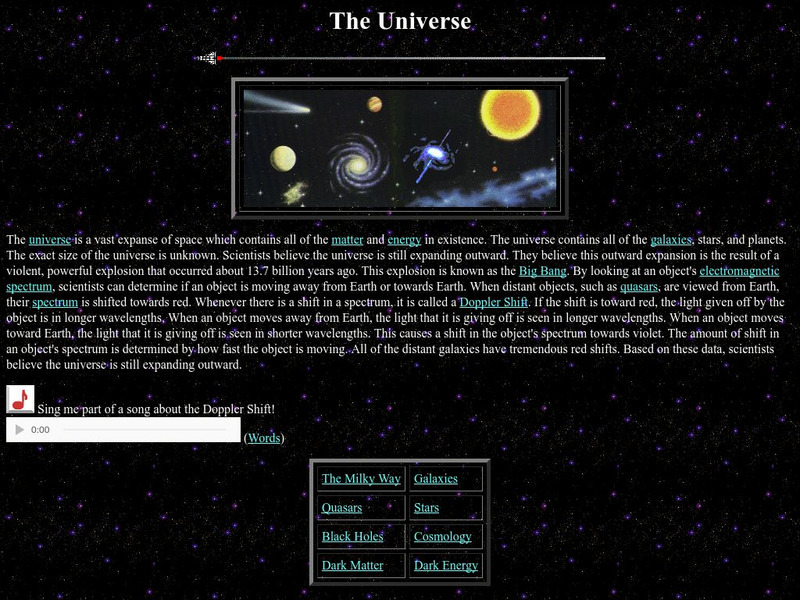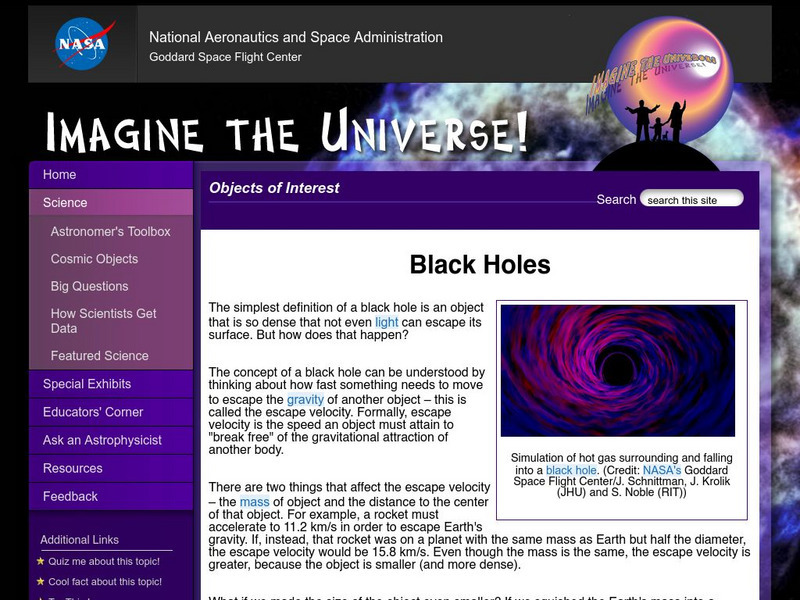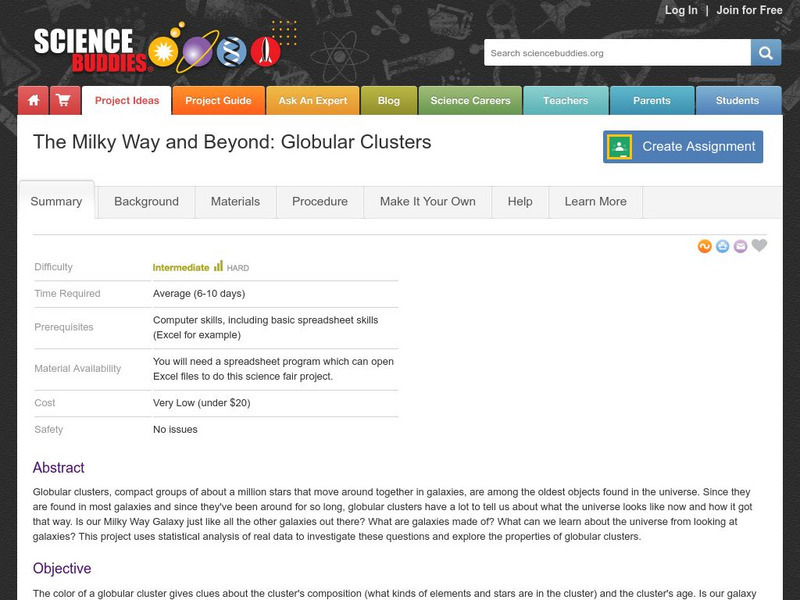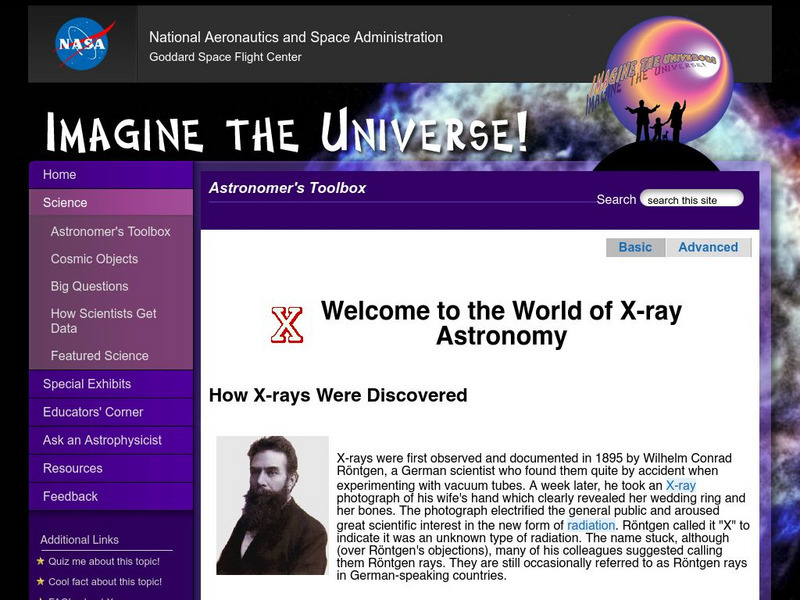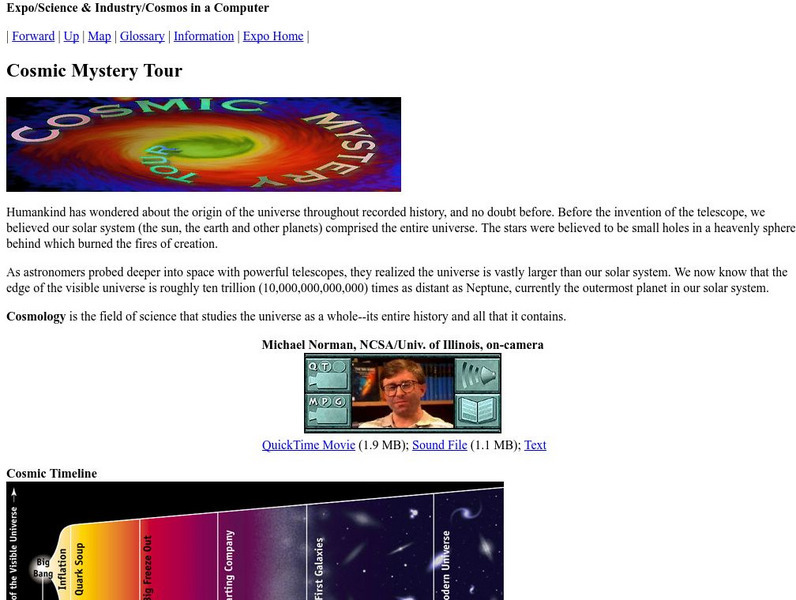Hi, what do you want to do?
Khan Academy
Khan Academy: Gallery: Structure in the Universe
The Universe is very diverse and contains many unique elements that can be observed in this gallery of pictures.
PBS
Pbs: Nova Online: Galaxies, Clusters, and Superclusters
PBS site explores these building blocks of the universe as well as their various types and clusters.
NASA
Nasa Star Child: The Universe (Level 2)
This site provides a description of the universe and what it contains. Includes links to definitions, activities, and an audio song. Printable version available.
NASA
Nasa: Imagine the Universe: Fa Qs on Quasars
A list of answers to many questions related to quasars and active galaxies.
European Space Agency
European Space Agency: Story of the Universe
The story of the universe is told in this engaging site by the European Space Agency. The history of European space science is timelined with dates ranging from 1066 to present day. The birth of galaxies, the big bang, and the beginnings...
NASA
Nasa: Imagine the Universe: Black Holes
Learn what black holes are and the myths that surround them.
Science Buddies
Science Buddies: The Milky Way and Beyond: Globular Clusters
Globular clusters, compact groups of about a million stars that move around together in galaxies, are among the oldest objects found in the universe. Since they are found most galaxies and since they've been around for so long, globular...
NASA
Nasa: Imagine the Universe: Dark Matter
Site provides an introduction to dark matter and what it really is. Provides links to a quiz as well as facts about dark matter. Offers links to additional resources as well as related topics.
University of Texas at Austin
The University of Texas Mc Donald Observatory: The Milky Way
Students will work in groups to make up a story and picture that explains how someone living thousands of years ago in their location might have explained the Milky Way.
Mocomi & Anibrain Digital Technologies
Mocomi: How Big Is the Universe?
Provides facts about the Universe, Jupiter, the Milky Way Galaxy, and Superclusters.
Scholastic
Scholastic: Study Jams! Science: Our Solar System: The Universe
A video and a short multiple-choice quiz on the Universe and what it is made up of.
Other
Northrop Grumman Corporation: Into the Unknown: Resources
The Northrop Grumman Corporation provides numerous resource about outer space and beyond.
PBS
Pbs Learning Media: Solar System Scale Model
Teach the concept of scale models and the size of the solar system through this extensive lesson plan. Students will learn about scale models, estimate which objects to use to create a scale model of Earth and Sun, and figure out how far...
Other
An Atlas of the Universe
What does the universe look like? This website offers visitors a collection of images that serve as an "atlas" of our universe. See multiple charts showing the Earth's distance from the Sun and other stars, find helpful terms in a...
NASA
Nasa: Imagine the Universe: Welcome to the World of Multiwavelength Astronomy!
This Imagine the Universe site provides an introduction into the multiwavelength universe and astronomy. Site provides graphics, links to a quiz, facts on this topic as well as teacher resources.
University of Texas at Austin
The University of Texas Mc Donald Observatory: Stars and Galaxies
Do galaxies collide? Apply concepts of scale to grasp the distances between stars and galaxies.
NASA
Nasa: Imagine the Universe: Welcome to the World of X Ray Astronomy
Site recounts how X-rays were discovered as well as who discovered them. Offers graphics, links to facts on this topic, a quiz, and teacher resources.
ACT360 Media
Act Den: Sky Den
This journey will help you solve big questions about the universe. You will be able to see beyond human capabilities and will learn what scientists are discovering.
Space Telescope Science Institute
Nasa: Hubble Space Telescope: Galaxies
At this site from HubbleSite you can learn all about galaxies and black holes. Click on the movie link and discover how old the universe is or study about what happens when two galaxies collide!
TED Talks
Ted: Ted Ed: What We Can Learn From Galaxies Far, Far Away
By studying the properties of the universe's largest pieces we can learn quite a lot about our own world and galaxy. [6:43]
Other
Astromador: Astronomia Para Amadores
This resources focuses exclusively on astronomy. It's packed with historical facts about space exploration, famous people who pioneered the study of stars and planets. It features chronological list of space exploration, current news,...
NASA
Nasa: Image Science Center: Ask the Space Scientist
A NASA scientist, Dr. Sten Odenwald, answers many students' questions. Topics include planets, galaxies, black holes, the origin of the universe, and common misconceptions about space.
University of Illinois
University of Illinois: Cosmic Mystery Tour
This multimedia tour is extremely dense with information about the origin of the universe. There are videos and simulations to assist with understanding, but it is definitely for advanced students.
NASA
Nasa: Imagine the Universe: X Ray Binary Stars
Site provides a brief introduction to binary stars. Additional resources for students and teachers on this topic are offered as well as related topics.







